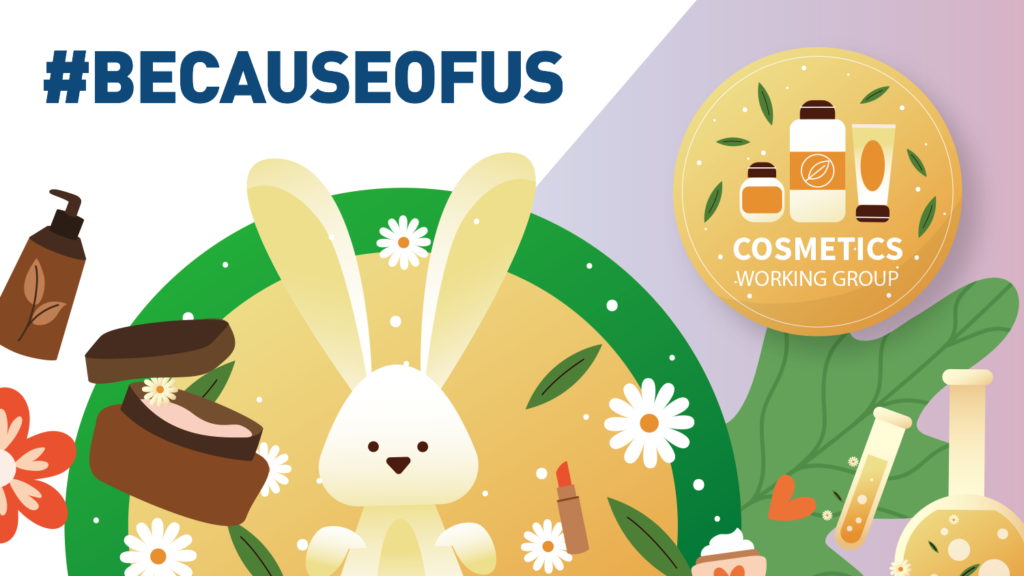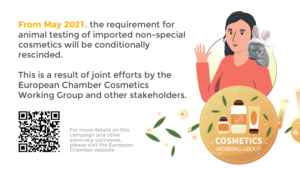
Animal testing successfully rescinded
As the independent voice of European business in China since 2000, the European Chamber actively participates in China’s legislative process and our advocacy activities are widely recognised by the Chinese authorities.
In 2019, we launched our #becauseofus campaign to show our gratitude for the joint advocacy efforts of all stakeholders: governments, think tanks, member companies and our own working group and desk managers. In EURObiz in 2021, we will present four examples of our successful advocacy work.
For this edition, we look at how the requirement for animal testing of imported non-special cosmetics was successfully rescinded.
——————————
On 4th March 2021, the National Medical Products Administration (NMPA) officially released the Provisions for Management of Cosmetic Registration and Notification Dossiers (Provisions), which went into effect from 1st May 2021. These Provisions finally conditionally waive the requirement for animal testing of non-special cosmetics imported into China, which has been in place since 1989. The European Chamber Cosmetics Working Group has worked continuously over the past 14 years to eliminate such requirements, advocating for advanced alternatives to animal testing.
Evolvement of animal tests in cosmetics
Global
In 1938, the United States Congress signed the Federal Food, Drug and Cosmetic Act into law, requiring proof of safety for cosmetics. Since then, animal testing has been used for assessing product safety.
In 1944, the Draize Test—a method in which the eyes and skin of animals are directly exposed to chemicals—was created.
In the 1980s, some animal protection organisations began to oppose animal testing of cosmetics.
In 1998, the United Kingdom announced an overall ban on animal testing of cosmetic ingredients.
In 2013, the European Union (EU) announced an overall ban on animal testing of cosmetics ingredients, and the sale of cosmetics and cosmetic ingredients tested on animals.
China
In 1989, the State Council promulgated the Regulations on Hygiene Supervision of Cosmetics, which required all beauty and personal care brands in China to conduct animal testing.[1]
In 2014, the CFDA released the Notice on Further Clarifying Implementation of Cosmetics Registration and Notification Issues, exempting domestic ‘non-special use’ cosmetics from animal testing. However, it was still required for imported cosmetics and domestic special-use cosmetics.
In November 2016, the CFDA published six alternative methods to animal testing, a milestone for the Chinese industry.
From May 2021, the requirement for animal testing of imported non-special cosmetics will be conditionally rescinded.
This is a result of joint efforts by the European Chamber Cosmetics Working Group and other stakeholders.
Efforts of the Cosmetics Working Group
The Cosmetics Working Group Position Paper has included a recommendation to rescind animal testing since 2007. Over the past 14 years, the Cosmetics Working Group has tracked the progress of relevant regulations, and communicated with various parties on industry updates and the alternative experimental methods used in other countries. The working group’s efforts include but are not limited to:
- collecting and collating member companies’ comments on regulations relating to animal testing exemptions and tests;
- providing feedback to the NMPA and the National Institutes for Food and Drug Control; and
- organising government-industry meetings on alternatives to animal testing and conditions for exemptions.
Can alternative animal testing ensure the safety of cosmetics?
Many of the cellular models used in alternatives to animal testing are based on human cell designs. In-vitro replacement using human-derived cell models is more relevant to human risk assessment and thus are better predictors of human responses to the effects of products and ingredients.
Advocacy results
In June 2020, the NMPA released the Cosmetics Supervision and Administration Regulations, in which significant changes and greater acceptance of animal testing replacements can be observed.

On 4th March 2021, the NMPA released the Provisions for Management of Cosmetic Registration and Notification Dossiers, which takes effect on 1st May 2021.
Under the Provisions, if a producer of non-special cosmetics has obtained the production quality management certification issued by the competent government department of the country or region where the production facility is located, and its safety risk assessment result has been substantiated, the producer may be exempted from submitting animal testing reports, except in the following circumstances:
- The product will be used on infants or children.
- The product uses new cosmetic ingredients that are still under safety monitoring.
- The notification applicant, domestic responsible person or production enterprise are listed as key supervision targets according to the NMPA quantitative rating system.
Janice Ma, chair of the Cosmetics Working Group
“The European Chamber Cosmetics Working Group has been working with the relevant regulatory authorities in China for many years to actively promote the research, validation and adoption of alternative methods and the improvement of China’s cosmetics safety risk assessment system, thereby continuously and further reducing animal testing. In the context of the implementation of the new regulations, the recently promulgated Guidelines for the Technical Assessment of Cosmetic Safety (2021 Edition), and the forthcoming Provisions for Management of Cosmetic Registration and Notification Dossiers, provide the possibility for imported non-special cosmetics to be exempt from animal testing under certain regulatory conditions. This reflects the determination of the Chinese regulatory authorities to speed up the construction and implementation of a scientific system for supervision of cosmetics, and is also a recognition of the joint efforts of industries and enterprises over the years.”
Implications
The waiving of animal testing for imported non-special cosmetics that meet the specified conditions will enhance China’s image worldwide, level the playing field for domestic and foreign enterprises, and optimise the business environment. The new Provisions will attract more foreign cosmetics brands to the Chinese market, allow those already in China to further expand, and enrich the choice of imported cosmetics available to consumers.
For more details on this campaign and other Advocacy Successes, please visit the European Chamber website: https://www.europeanchamber.com.cn/en/advocacy-success
[1] Note: The administration of cosmetics was transferred to the China Food and Drug Administration (CFDA) in 2009, and to the NMPA in 2018.


Recent Comments